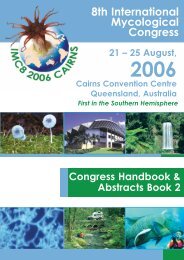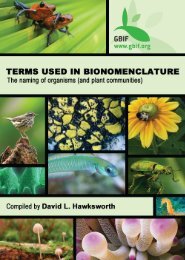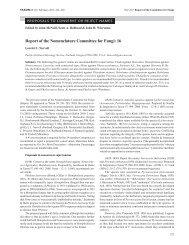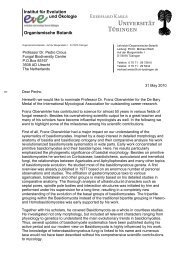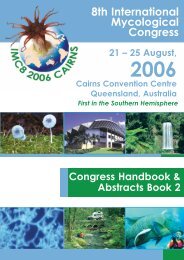Book of Abstracts (PDF) - International Mycological Association
Book of Abstracts (PDF) - International Mycological Association
Book of Abstracts (PDF) - International Mycological Association
You also want an ePaper? Increase the reach of your titles
YUMPU automatically turns print PDFs into web optimized ePapers that Google loves.
IMC7 Friday August 16th Lectures<br />
384 - The importance <strong>of</strong> fungi<br />
A.J.S. Whalley<br />
School <strong>of</strong> Biomolecular Sciences, Liverpool John Moores<br />
Univeristy, Byrom Street, Liverpool, L3 3AF, U.K. - Email:<br />
bmsawhal@livjm.ac.uk<br />
Why study fungi? Politicians and grant awarding bodies<br />
focus on the applied, the popular or the trendy. Fungi sadly<br />
are rarely seen to fit into these categories. It is however our<br />
duty as mycologists to demonstrate that fungi are one <strong>of</strong><br />
the Worlds greatest living resources and estimates <strong>of</strong> 1.5<br />
million species or more are becoming increasingly likely.<br />
Their track record for the benefit <strong>of</strong> man is without<br />
question. Where would we be without penicillins,<br />
cyclosporins cephalosporins and other important<br />
pharmaceutical products? At least 80 percent <strong>of</strong> the worlds<br />
plants have mycorrhizal associations without which they<br />
would grow poorly or not at all. We could be justified in<br />
saying no fungi no world! These <strong>of</strong> course are beneficial<br />
activities but their global significance as pathogens <strong>of</strong><br />
economic plants and, more recently though HIV, man<br />
should not be underestimated. Imagine the political<br />
reaction if fungi were the perfect bio-weapons! This<br />
symposium follows on from Vancouver where the then<br />
President <strong>of</strong> IMA stated stand up and be proud to be a<br />
mycologist because if you dont there will be few left in ten<br />
years time. Eight years on is a good time to reflect and<br />
prepare for the future. Mycology is in our hands and it is<br />
our responsibility to make the subject exciting, emphasize<br />
its relevance and to woo the appropriate individuals and<br />
organizations.<br />
385 - Awareness to Public<br />
R. Watling<br />
Caledonian <strong>Mycological</strong> Enterprises, Crelah, 26<br />
Blinkbonny Ave, Edinburgh, EH4 3HU, Scotland, U.K. - Email:<br />
caledonianmyc@compyserve.com<br />
Promoting fungi at the grass roots is essential for the<br />
development <strong>of</strong> a healthy appreciation <strong>of</strong> the role fungi<br />
play and as mycologists its our duty to the community to<br />
inform. The paper will present case-studies in which<br />
pubic/mycological interface has been forged. It is<br />
necessary to inject interest in fungi at a range <strong>of</strong> levels<br />
from schools to adult education programmes. There are<br />
more people in Britain than ever before collecting and<br />
eating wild fungi and keen to know about their quarry and<br />
many natural historians who wish to know about their<br />
natural heritage but lack the knowledge and resources or<br />
where to look for such information. These are very<br />
receptive audiences. Children have strong influences on<br />
their adults and they are the adults <strong>of</strong> the future. The<br />
informed public is a useful ally in that it understands wellpresented<br />
media coverage, lobby on behalf <strong>of</strong> mycology<br />
and in addition includes a volunteer army happy to spend<br />
long hours collecting, recording and monitoring. In contrast<br />
many others, including politicians, consider fungi <strong>of</strong><br />
nuisance value or even deadly and rarely think (or know)<br />
<strong>of</strong> the benefits. Celebrities can help to disseminate the<br />
message. If mycology is to be supported by Government<br />
agencies then they and voters require to know how<br />
important fungi are to everyday life and well-being <strong>of</strong> our<br />
planet. Mycologists are the people who know about fungi<br />
so it is up to us; if all fails we cannot blame anyone else!.<br />
386 - Integration <strong>of</strong> mycology with other disciplines<br />
N.A.R. Gow<br />
Univerity <strong>of</strong> Aberdeen, Insitute <strong>of</strong> Medical Sciences,<br />
Aberdeen AB25 2ZD, U.K. - E-mail: n.gow@abdn.ac.uk<br />
One vision <strong>of</strong> mycology is that our discipline is<br />
undervalued and underfunded. The accuracy <strong>of</strong> such a view<br />
is open to debate but reiteration <strong>of</strong> this negative view<br />
undermines the value and potential <strong>of</strong> mycology. Other<br />
disciplines also feel disadvantaged and have equal cause<br />
for concern about the future. Therefore, it may seem<br />
perverse or naïve to present on overtly positive vision <strong>of</strong><br />
mycology in the current climate, but there are many<br />
opportunities for the modern era <strong>of</strong> mycology. The<br />
mycological remit is broad with highly studies model<br />
systems taking their place amongst the most important and<br />
fashionable and systems in which to explore basic<br />
biological processes. Genomics and post-genomic data<br />
bases and technologies are being developed by cell and<br />
molecular biologists, bacteriologists, parasitologists and<br />
botanists that will have tremendous utility in the analysis <strong>of</strong><br />
fungi. The fungi are rich in organisms with critical roles to<br />
play in ecology, biotechnology, medicine, agriculture and<br />
other aspects <strong>of</strong> human endeavour, and remain one <strong>of</strong> the<br />
few relatively unexplored corners <strong>of</strong> global biodiversity.<br />
With the right tools, a multidisciplinary approach and an<br />
open mind, mycology can be seen to be at the beginning <strong>of</strong><br />
an exciting and highly competitive era. This talk will<br />
accentuate this naively positive view with selected<br />
examples <strong>of</strong> how mycology is already evolving in this new<br />
era.<br />
387 - Educational aspects <strong>of</strong> promoting mycology<br />
D. Moore<br />
The University <strong>of</strong> Manchester, School <strong>of</strong> Biological<br />
Sciences, 1.800 Stopford Building, Manchester M13 9PT,<br />
U.K.<br />
From the standpoint <strong>of</strong> recent experiences, I will discuss<br />
the need for active promotion <strong>of</strong> mycology at all<br />
educational levels. However strongly, and however loudly,<br />
the case for the importance <strong>of</strong> fungi is put, we face an<br />
uphill struggle to have mycology included in general<br />
educational courses. Inclusion as a 'specialist study <strong>of</strong> a<br />
taxonomic group' is feasible in college and university<br />
courses, but there is little sympathy for the view that a<br />
<strong>Book</strong> <strong>of</strong> <strong>Abstracts</strong> 121



